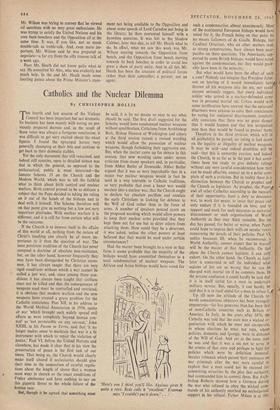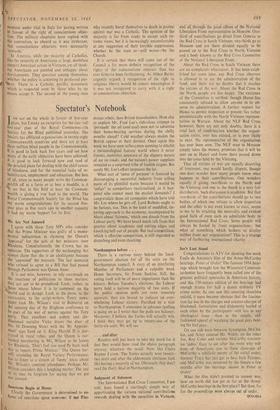Catholics and the Nuclear Dilemma
. By CHRISTOPHER HOLLIS THE fourth and last session of the Vatican Council has been important but not dramatic. Its business has been mainly with voting on pre- viously prepared decrees and, as the result of those votes was always a foregone conclusion, it was difficult to get very excited about the exact figures. I found the episcopal horses very generally champing at their bits. and anxious to get back to their domestic stables.
Yet the only document that still remained, and indeed still remains, open to detailed debate was that in which the general, as opposed to the ecclesiastical, public is most interested—the famous Schema 13 on the Church and the Modern World, which was to tell the faithful what to think about birth control and nuclear warfare. Birth control proved to be so delicate a subject that the Pope decided to taking the ruling on it out of the hands of the bishops and to deal with it himself. The Schema therefore will on that point give us nothing but a few not very important platitudes. With nuclear warfare it is different, and it is still far from certain what will be the outcome.
If the Church is to interest itself in the affairs of this world at all, nothing from the nature of Christ's teaching can clearly be of more im- portance to it than the question of war. The most persistent tradition of the Church has never accepted a doctrine of absolute non-resistance, but, on the other hand, however frequently they may have been disregarded by Christian states- men, it has always taught that there are very rigid conditions without which a war cannot be called a just war, and, since among those con- ditions it has always been taught that civilians must not be killed and that the consequences of weapons used must be controlled and restricted, it is obvious that modern warfare and the new weapons have created a grave problem for the
Catholic conscience. Pius XII, in his address to the World Medical Association in 1954, spoke of war 'which brought such widely spread evil effects as were completely beyond human con- trol' as 'not permissible on any account.' John XXIII, in his Pacem in Terris, said that 'it no longer makes sense to maintain that war is a fit instrument with which to repair the violation of justice.' Paul VI, before the United Nations and elsewhere, has made it clear that in his view the preservation of peace is the first task of our times. That being so, the Church would clearly make itself absurd if ecclesiastics should give their time to the concoction of careful regula- tions about the length of sleeve that a woman
• must wear in church or the exact conditions of Friday abstinence and have nothing to .say on this gigantic threat to the whole future of the hunian race.
But, though it be agreed that something must
be said, it is by no means so easy to say what should be said. The first draft suggested for the Schema would have condemned nuclear weapons without qualification. Criticisms from Archbishop Beck, Bishop Hannon of Washington and others at the third session caused, a revised wording which would allow the possession of nuclear weapons, though forbidding their aggressive use. But, when the matter came up for debate in this session, that new wording came under severe criticism from many speakers and, in particular, from Abbot Butler of Downside. Abbot Butler argued that it was so very improbable that in a major war nuclear weapons would in fact be used in a way tolerable to Catholic traditions, so very probable that even a lesser war would escalate into a nuclear war, that the Church ought to declare for absolute pacifism and emulate the early Christians in looking for defence to the Will of God rather than to the force of arms. A number of speakers poured scorn on the proposed wording which would allow powers to keep their nuclear arms provided that they kept them not for use but to deter others from attacking them. How could they be a deterrent, it was asked, unless the other powers at least believed that they would be used under certain circumstances?
Had the matter been brought to a vote in that form it seems probable that the majority of the bishops would have committed themselves to a total condemnation of nuclear weapons. The African and Asian bishops would have voted for 'Here's one I think you'll like. Aquinas gives it quite a rave. Bede calls it "excellent." Erasmus says "1 couldn't put it down." . . such a condemnation almost unanimously. Most of the continental European bishops would have voted for it, the French being on that point by no means followers of de Gaulle. Bishops, like Cardinal Ottaviani, who on other matters rank as strong conservatives, have always been near- pacifist on these questions. The Americans, sup- ported by some British bishops, would have voted against the condemnation, but they would prob- ably have been in the minority.
But what would have been the effect of such a vote? Nobody can imagine that President John- son on hearing of it would immediately haveo, thrown all his weapons into the sea, nor could anyone seriously suggest that every individual soldier who served in a nuclear-defended army was in personal mortal sin. Critics would with some justification have sneered that the episcopal disarmers were anxious to salve their consciences by voting for unilateral disarmament, comfort- ably conscious that there was no great danger that it would happen and that less scrupulous men than they would be found to protect them.. t Therefore in the third revision, which will in all probability be passed, no ruling is laid down on the legality or illegality of nuclear weapons.
It may be said—and indeed doubtless will be said—that this is unworthy evasion, and indeed the Church, in so far as in the past it has some- times been too ready to give definite rulings without any very careful consideration how they can be made effective, cannot up to a point com- plain of such a criticism. But in reality there is a distinction between the Church as prophet and the Church as legislator. As prophet, the Popes and all other Catholics according to the measure of their opportunity, have a duty to denounce war, to work for peace, to insist that peace can only endure if it is founded on love, and to support and work for such measures as universal disarmament or such organisations of World Authority as they may think valuable. But the day has passed, for better or worse, when Popes could hope to impose their wills on secular rulers concerning the details of their policies. Paul VI, unlike Innocent III, when he recommends a World Authority, cannot expect that he himself will be the master of that Authority. On that plane the Church cannot legislate; it can only exhort. On the other hand, the Church as legis- lator is concerned to tell the individual what actions of his are so wrong that he can be charged with mortal sin if he commits them. In the present confusion it could hardly be 'said that it is in itself sinful for a man to undertake military service. But, equally, it can hardly be said that it is in itself sinful for a man to refuse it., Up till now the attitude of the Church to- wards conscientious objectors has been strangely ungenerous—far less generous than has been that of non-Catholic countries such as Britain or America. In Italy, in the years after 1870, the Catholic was told that the state was a wicked or-
ganisation with which he must not co-operate, in whose elections he must not vote, whose policies, domestic and fpreign, were in defiance of the Will of God. And yet at the same time he was told that it was a sin not to serve in the armies of that state and perhaps to fight for policies which were by definition immoral, Secular tribunals which passed their sentences on war criminals after the war were careful to explain that a man could not be excused for committing atrocities by the plea that authority had commanded him to commit them. But Arch- bishop Roberts showed how a German during the war who refused to obey the wicked com- mands of his authority received no ecclesiastical support in his refusal. Father Milani is at this
moment under trial in Italy for having written in favour of the right of conscientious objec- tion. The military chaplains have replied with the contention, as absurd as it was irrelevant, that conscientious objectors were necessarily cowards.'
In America, while the majority of Catholics, like the majority of Americans at large, doubtless support American action in Vietnam, yet all think- ing Americans are puzzled and unhappy about developments. They question among themselves Whether the policy is achieving its professed pur- e ose. There is a Catholic pacifist movement which is respected even by those who by no means accept it. The second of the young men who recently burnt themselves to death in protest against war was a Catholic. The opinion of the majority is far from ready to accept such ex- treme views, but it is increasingly uncomfortable at any suggestion of their forcible suppression, whether by the state or—still worse—by the Church.
It is certain that there will come out of the Council a far more definite recognition of the rights of the conscientious objector than has ever hitherto been forthcoming. As Abbot Butler cogently argued, a recognition of the right to religious liberty would he almost meaningless if it was not recognised to carry with it a right to conscientious objection.



















































 Previous page
Previous page